Introduction – Clean Water Globally
Clean water is the first thing to consider regarding a healthy lifestyle. Water, along with air, food, shelter, are considered really the absolute fundamental essentials to life. Yet, 25% of the world, or about 2 billion people lack access to water as reported by the UN and UNICEF. We can learn a lot from both countries that lack access to water as well as countries with the cleanest water.
[Update: 12/21/2023 – we revised the article with updated EPI numbers to generate a new ranking of top 7 countries with the cleanest water]
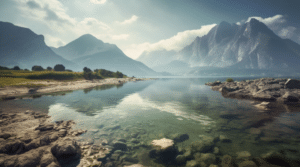
Only a few countries are well-known for the cleanest water in the world. These countries have advanced water purification systems that reduce the number of pollutants in their drinking water.
Great infrastructure ensures citizens’ drinking water is free from harmful chemicals and bacteria. Or, if you’re like a lot of first world country residents, you might just get an eco-friendly water filter anyway!
The secret to having the cleanest water in the world lies in properly maintaining these filtration systems. In this post, we share the seven countries that have the cleanest water.
7 Countries With The Cleanest Water In The World
1. Denmark
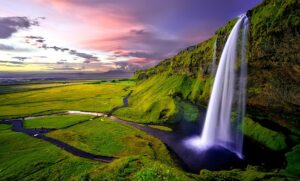
EPI Score: 77.90
Denmark, ranked first in the Environmental Performance Index, demonstrates exceptional water quality and sustainable management. Known for its commitment to environmental sustainability, Denmark has invested heavily in water treatment technologies and infrastructure.
The Danish government emphasizes the importance of maintaining natural water ecosystems, ensuring the safety and purity of its drinking water. This approach reflects Denmark’s broader environmental policy, which focuses on balancing human needs with ecological preservation.
Denmark’s progress in water quality is part of its larger commitment to environmental excellence and sustainability.
2. United Kingdom
EPI Score: 77.70

The United Kingdom, holding the second rank, showcases a remarkable improvement in water quality over the past decade. This achievement is a result of significant investments in water treatment and pollution control measures.
The UK’s approach to water management emphasizes both the quality of drinking water and the health of aquatic ecosystems. Efforts such as stringent regulatory standards and innovative water purification technologies have played a crucial role in enhancing the UK’s water quality, reflecting its commitment to environmental stewardship and public health.
3. Finland
EPI Score: 76.50
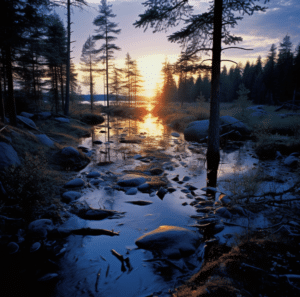
Finland, ranking third, is renowned for its pristine natural environment, which significantly contributes to its exceptional water quality. Finnish water management policies focus on preserving the natural purity of water sources and minimizing human impact.
The country’s commitment to environmental sustainability is evident in its approach to water conservation and pollution control. This has resulted in a notable improvement in water quality over the years, reflecting Finland’s dedication to maintaining its natural beauty and ensuring clean water for all its residents.
4. Malta
EPI Score: 75.20
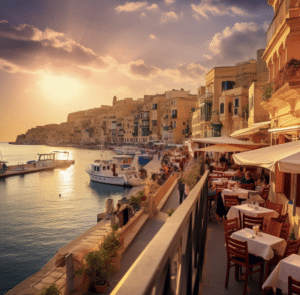
Malta, positioned fourth, has shown significant progress in water quality and management. As a small island nation, Malta faces unique challenges in water resource management.
Despite these challenges, it has implemented effective water conservation practices and advanced desalination technologies. These efforts have greatly improved the quality of drinking water and reflect Malta’s commitment to sustainable water management.
Malta’s substantial improvement in the EPI rankings over the last decade showcases its dedication to environmental stewardship and innovation in water technology.
5. Sweden
EPI Score: 72.70
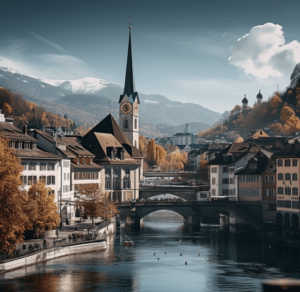
Sweden, with its impressive natural landscapes, ranks fifth in water quality. The country’s commitment to environmental sustainability is evident in its water management strategies.
Sweden’s approach involves protecting natural water sources, investing in advanced water purification technologies, and implementing strict regulations on pollutants. These measures have contributed to maintaining high-quality drinking water and safeguarding aquatic ecosystems.
Sweden’s consistent progress in water quality is a testament to its dedication to preserving its rich natural heritage and ensuring the health and wellbeing of its population.
6. Luxembourg
EPI Score: 72.30
Luxembourg, ranking sixth, demonstrates its commitment to water quality through advanced water treatment processes and strict environmental regulations. As a small, affluent nation, Luxembourg has the resources to invest heavily in water infrastructure and technology.
This investment, coupled with a strong regulatory framework, ensures the provision of high-quality drinking water and the preservation of its aquatic environments. Luxembourg’s progress in the EPI rankings reflects its dedication to sustainable water management and environmental conservation.
7. Slovenia
EPI Score: 67.30
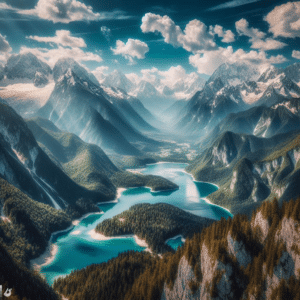
Slovenia, securing the seventh rank, is noted for its effective environmental policies and pristine natural resources. The country’s commitment to sustainable water management is evident in its efforts to protect and maintain its abundant freshwater resources.
Slovenia’s approach includes rigorous water conservation practices, investment in modern water treatment facilities, and strong emphasis on reducing water pollution. These efforts have contributed to significant improvements in water quality, showcasing Slovenia’s dedication to environmental stewardship and the health of its citizens.
Common Criteria Are Used To Rank Countries With Cleanest Water
When evaluating water, a large number of factors play into the score a country receives. Roughly we can think of them falling into three categories: access, quality, and sustainability.
- Access: This is the proportion of the population that can easily obtain safe drinking water. This data can be gathered from surveys and infrastructure assessments.
- Quality: This involves testing the water for contaminants. There are several key metrics, including the presence of harmful bacteria, viruses, and parasites; the concentration of harmful chemicals (such as heavy metals or pesticides); and the water’s pH, turbidity, and hardness. These tests require lab equipment and trained personnel, and they may need to be done frequently to account for temporal variations in water quality.
- Sustainability: This takes into account how well a country’s water resources are managed to ensure they continue to provide clean water in the future. This can involve factors such as water usage rates, conservation measures, pollution control, and the health of watersheds.
Combining all this data gives a comprehensive view of a country’s water situation.
Caveat of course is that different metrics might prioritize different factors.
For instance, one ranking might prioritize access, while another might prioritize chemical purity.
World Economic Forum, Yale And Columbia EPI Is Used To Rank Objectively
Prior we had used more subjective means of ranking the countries.
This time in July of 2023, we switched to using a measure based on data collected by the WEF and two universities Yale and Columbia.
The Environmental Performance Index (EPI) is a comprehensive index that provides a quantitative measure of a country’s environmental performance in relation to established sustainability benchmarks.
Established by Yale and Columbia Universities in collaboration with the World Economic Forum, the EPI assesses 40 different performance indicators across 11 categories such as air quality, water resources, biodiversity, and climate change, to assign a score that demonstrates how close a country is to achieving its environmental targets.
These scores offer a useful way to compare countries’ performances, identify successful policy practices, and highlight areas needing improvement.
Inclusion of the EPI scores in the review of countries with clean drinking water is crucial as it provides an objective measure of a country’s overall commitment to maintaining and improving water quality, a key component of environmental health.
It provides context to the list, highlighting not just the current state of water quality but also how these countries fare in broader environmental stewardship, which has direct and indirect impacts on water quality.
It also points to these countries’ capability to sustain their performance in the long run, helping to underscore the importance of holistic environmental policies in ensuring clean and safe drinking water.
Conclusion – Cleanest Water In The World
In conclusion, it’s worth noting that along with these seven countries, there are many other nations around the globe where you can find some of the cleanest water in the world.
More countries can join this list of nations with the purest water with proper maintenance and investments in clean drinking water initiatives. Spreading awareness about the importance of a clean and healthy lifestyle, which includes access to clean drinking water, is important.
If we all take steps toward protecting our environment from pollution, we will be able to enjoy the benefits of some of the cleanest water in the world for years to come.
